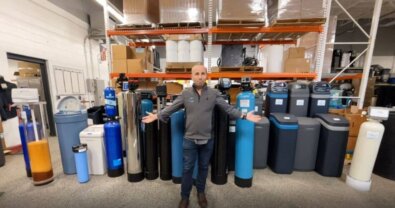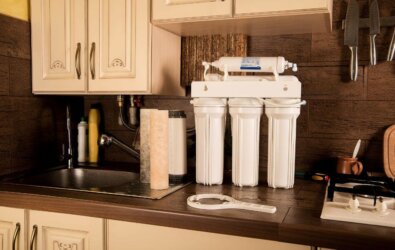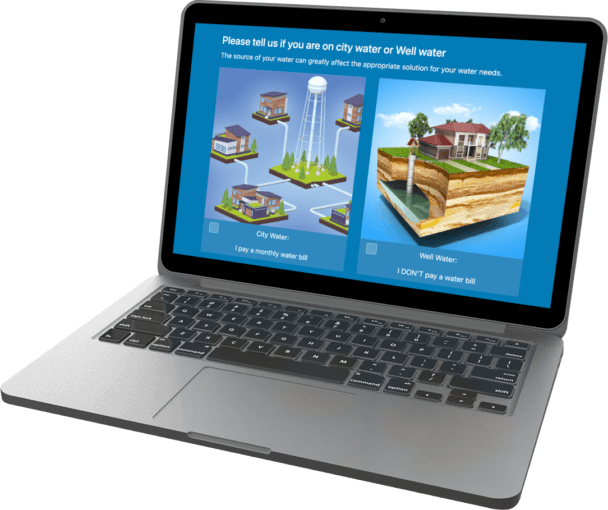Sick of Cloudy Dishes from the Dishwasher? How to Easily Fix the Problem
This blog features the following key takeaways:
- Hard water causes dishwashers to produce cloudy dishes and milky glasses.
- Any solution to this problem that doesn’t eliminate hard water is inadequate.
- A water softener is the best solution because it gets rid of the hard water minerals that cause the problem.
- Water softeners save homeowners money and time and eliminate stress in the long run.
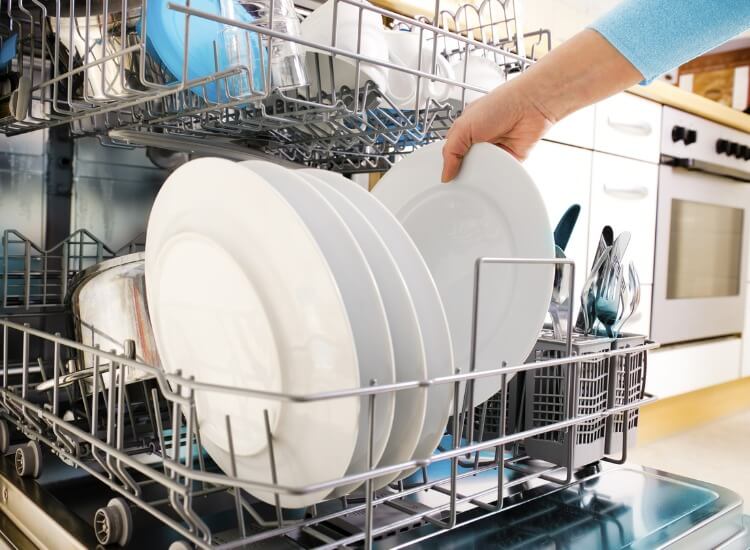
So, we understand your frustration when you open the dishwasher to find milky glasses and cloudy dishes staring back at you.
Your dishwasher has failed its main purpose because you’re now thinking about your dishes.
What’s even more frustrating is when you go online to figure out how to fix this problem, you only find “solutions” that add extra steps to your dishwashing process.
All you want to do is get back to putting your dishes into the dishwasher and having them come out squeaky clean, but now they’re telling you to also soak them in vinegar first?
No thank you!
Before you lose all hope, we want to assure you that this is not another one of those posts.
We’re not here to give you more hoops to jump through when washing dishes. Instead, we have one simple solution that will add no hoops to your dishwashing routine.
Are you ready for it?
The solution is… drumroll, please… Get a water softener!
Now before you click away, hear us out. A water softener may seem like an expensive solution to your dishwashing problem. But in this post, we’ll show you why it’s the best option for your long-term happiness and wellbeing.
In short, only a water softener will fix the root of the problem to give you the easiest possible dishwashing routine for years to come.
Intrigued? Good. Here’s why you should be:
The Root of the Problem is Likely Hard Water
Let’s take a step back and analyze this problem detective-style. At the scene of the crime we have milky glasses, cloudy dishes and three main suspects:
- Your dishwasher
- The dishwashing liquid you use
- Your water
It stands to reason that one of these three is responsible for those hideous marks on your precious dishware. But which one did it?
You’ve probably already figured out the answer based on the title of this section. Still, let’s take a closer look at each suspect to determine why your water is more likely to blame than the other two.
Ruling Out Your Dishwasher
Could these splotches be the symptom of a problem with your dishwasher? They could, but they probably aren’t.
A simple way to rule this option out is to inspect your dishwasher and make sure everything is in working order. Here are a few things to check:
- Are the spray arms clogged or broken?
- Is the inside of your dishwasher clean?
- Has any scale or residue built up in the bottom of the dishwasher?
- Is the seal on your dishwasher door dirty?
Your dishwasher could be leaving white residue because of any of these issues. There’s an easy way to figure this out. Simply give your system a little TLC and then try to wash those dishes again.
But we’re guessing your dishwasher doesn’t have any apparent problems. It’s running perfectly fine and yet keeps producing these milky glasses.
If that’s the case, we can easily rule out your dishwasher and move on to suspect number two: your dishwashing liquid.
Ruling Out Your Dishwashing Liquid
Here’s where the case gets a little more interesting. The liquid you use to wash your dishes is a slightly more likely candidate than your dishwasher because it has been known to scuff up a glass or two from time to time. This problem is known as etching.
Etching can occur for a few different reasons:
- You’re using too much detergent.
- The water temperature is too high for your detergent.
- You’re rinsing your dishes off too thoroughly before putting them in the dishwasher.
Any of these conditions can cause your detergent to wear away at your dishware, leading to more pronounced scuffs and marks over time. Unfortunately, etching marks are permanent.
But fortunately, this makes it very easy to tell if your detergent is the culprit. All you need to do is take a scuffed-up glass and soak it in vinegar for a few minutes. If you pull it out of the vinegar and the scuffs remain, then you’re dealing with etching.
To prevent etching moving forward, simply use less detergent, lower your washing temperature and avoid rinsing the dishes before you put them in the washer.
However, if vinegar washes the marks away, then the culprit is your water.
Why Your Water is the Most Likely Culprit
Sure, dishwashers can malfunction every now and then. And yes, improper detergent use can occasionally cause etching. But the most common perpetrator of cloudy dishes is undoubtedly hard water.
We can say this with confidence because the stats back this up. Most homeowners in the United States live in a region in which the water is at least somewhat hard. Our company serves two areas with very hard water: Northern Illinois and Southeast Florida. So, we’ve seen firsthand how often hard water causes this problem.
NEW! Stop Wasting Money!
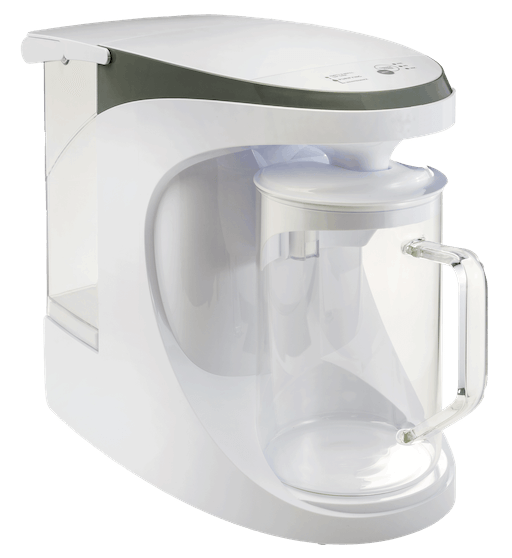
Are you spending money every month on Bottled Water for your home or office? That adds up quickly and with inflation, it’s only going to cost more tomorrow.
With the NEW purAsure Counter top Reverse Osmosis System you never have to pay for another case of plastic bottles! Get yours before the price goes up and Enjoy cleaner, healthier water on demand!
How does hard water cause film on dishes and milky glasses? The answer is pure science.
Hard water contains a ton of calcium and magnesium particles, which don’t interact well with the dishwashing liquid. When the particles mix with the soap a chemical reaction occurs and produces a curd commonly known as soap scum. Instead of rinsing away with the water as they should, these soapy globules cling to dishes, making them appear milky and cloudy.
Want more local water information sent right to your inbox?
Sign up for our email newsletter.
All Other Solutions are Inadequate
It’s safe to say water is the number one cause of this problem. So, why do all the solutions you find on the Internet suggest changing everything but your water?
We’ve seen everything suggested, from adding more detergent to soaking the dishes in vinegar before cleaning. Some say to increase your water temperature. Others recommend switching detergents or using a rinse aid. We even saw one site suggesting that you swab the dishes with nail polish before scrubbing them with detergent (we wouldn’t recommend this, by the way).
All these solutions dance around the fact that even if you change your cleaning supplies, you’ll still be combining them with hard water. Do you really think a different detergent will help if the main source of the problem remains?
The change may decrease the cloudiness for a time, but the symptom will keep coming back until you address the root of the problem.
You need to get rid of hard water to fix your milky glass problem for good. Only a water softener can do that.
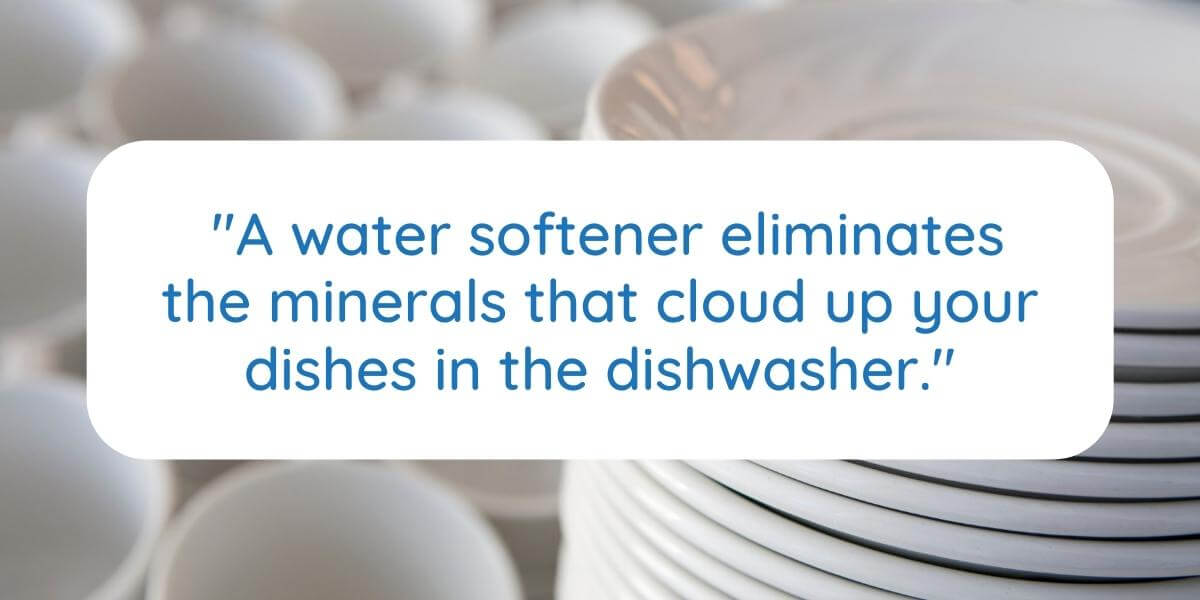
Why a Water Softener is the Best Solution for Cloudy Dishes
Water softeners are godsends for homeowners who are sick and tired of annoying problems like cloudy dishware. This is because they intercept water as it enters the home and take out all those problematic minerals. As a result, the water does what it’s supposed to so that you don’t have to waste time or money trying to fix problems.
Here’s an overview of the three reasons a water softener is your best solution:
Water Softeners Cut Off the Problem at Its Root
As we’ve established, the calcium and magnesium minerals in hard water are what mess up the dishwashing process by making dishes cloudy. So, what do water softeners do to solve this problem? They address it head-on by completely removing calcium and magnesium from the water.
The process is simple. Hard water flows into the softener and flows through a bunch of tiny resin beads. These beads have a negative charge, which pulls the positively charged calcium and magnesium ions off of the water droplet. Thus, the softener literally pulls these minerals out of the water at a microscopic level. As a result, the newly softened water can make its way to your dishwasher, where it won’t leave any more milky splotches on your dishware. It’s as simple as that!
To make sure you get these results, we recommend investing in a softener that’s NSF/ANSI 44 certified. The softeners with this stamp of approval have gone through rigorous testing to ensure they work properly. With an NSF-certified softener, you’ll enjoy clear dishes for a long time.
Softeners Keep Things Simple
That brings us to our second benefit: water softeners make your life easier than any other solution out there.
All other solutions for cloudy dishes require you to change up your dishwashing routine in one way or another. But a water softener will allow you to get back to basics by making your dishwasher work the way it should so that you don’t have to!
And don’t worry about the extra work required for installing and maintaining a system. There’s professional assistance available for both! A licensed plumber can install and maintain your system for you to keep the best results coming. So, there’s no extra effort required on your end at all.
You’ll Benefit Greatly in the Long Run
Okay, this all sounds great, right? But let’s talk about the elephant in the room: the cost. The biggest drawback of investing in a water softener to fix your cloudy dishes is softeners are expensive. The highest quality ones cost over $1,000 plus extra fees for salt replacement, installation and maintenance.
We get it if you’re hesitant and would rather go with a cheaper quick fix. But here’s the thing: While that cheaper quick fix will save you money up front, a water softener will save you much more over time.
In our opinion, the high upfront cost is worth it for the money you’ll save not having to buy those extra cleaning supplies to combat the cloudiness. Furthermore, hard water is notorious for causing dishwashers to break down prematurely. So, you will protect yourself from those extra repair costs too.
But beyond monetary savings, you’ll also save yourself time because you won’t have to add extra steps to your dishwashing routine. And you won’t have to endure all the undue stress and embarrassment that comes with unsightly white film on your glasses.
To top it all off, cloudy dishes aren’t the only issue water softeners solve. If you’ve lived with hard water for a while, then you’ve probably also encountered dry skin, brittle hair, low water pressure, brown toilet bowl stains, discolored clothing and more. Hard water causes all these problems. By softening your water, you can experience freedom from all of them!
Stop Wasting Time Stressing About Your Milky Glasses!
One of the best feelings in life is automating a tedious process. Your dishwasher does that by producing crystal clear dishes for you. A water softener will ensure those dishes stay clear by supplying your dishwasher with the soft water it needs to rinse properly.
So, don’t waste another second overcomplicating things. Instead, find the softener that will make your life easier!
We can help you make that happen. You can get the expert help you need to purchase, install and maintain your system right here at Angel Water! We serve Barrington, IL, West Palm Beach, FL, and the surrounding regions.
Please give us a call at 847-382-7800 or visit our water softener page to get started.
Interested in a Water Softener System for Your Home?
You don’t have to live with a dry, itchy scalp and brittle hair anymore! It would be our pleasure to help you find the right water softener to make your showers enjoyable again.
Please give us a call at (847) 382-7800 or visit our water softener page to learn more.
